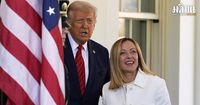The global economic landscape is undergoing significant shifts as leaders from the United States and Italy engage in high-stakes trade discussions. President Donald Trump recently expressed his confidence in reaching trade agreements with both China and the European Union (EU) by the end of May, amid concerns over Italy's trading relationships with China.
During a meeting with Italian Prime Minister Giorgia Meloni, Trump revealed that the U.S. government is actively negotiating trade terms with China, asserting that both nations are on a path toward a mutually beneficial agreement. He stated, "I believe we will reach an agreement with China, and if we don’t, we will still have a deal because we have set some goals, and that will be the end of it." This optimism reflects a broader strategy aimed at stabilizing U.S. trade relations while addressing concerns about China's economic practices.
Meloni, who is the first European leader to meet Trump since he announced increased tariffs on imports, echoed the urgency of these discussions. She emphasized the importance of finding common ground and strengthening transatlantic ties. "I think we need to talk and find out what the best middle ground is to grow together," Meloni stated. She expressed her commitment to ensuring that Italy remains a reliable trading partner for the U.S. and that the West stands united in its economic pursuits.
However, the discussions have not been without tension. Trump urged Italy to reconsider its trade relations with China, asserting, "I don’t want Italy to get involved with China or deal with a third-rate president from China." This statement underscores the U.S. administration's concerns about China's growing influence in global markets and its impact on European economies.
In response, Meloni acknowledged the complexity of the situation, noting that while she believes it is possible to halt trade with China, doing so in the context of the EU presents challenges. "This is something that may or may not happen with Europe as well, depending on preparedness and willingness," she remarked. This highlights the delicate balancing act that European leaders must perform as they navigate their economic relationships with both the U.S. and China.
The backdrop of these negotiations includes the Bank of Italy's recent report indicating signs of slowing economic growth in the first quarter of the year. While specific GDP figures were not disclosed, the report signals potential challenges ahead for Italy’s economy, which could influence the outcomes of trade discussions. The Bank of Italy's forecasts are based on closely monitored economic data and indicators, suggesting that Italy's economic performance will be a critical factor in its trade strategy.
As Trump and Meloni continued their discussions, the U.S. president remained steadfast in his belief that the U.S. holds a strong position in global trade negotiations. He confidently stated, "No one can compete with us, no one at all." This assertion reflects a broader U.S. strategy to reinforce its economic dominance and counter perceived threats from emerging markets.
Meloni's visit to the White House was not only about trade agreements but also about fostering a stronger partnership between Italy and the U.S. She expressed her desire to invite Trump for an official visit to Italy, aiming to solidify their diplomatic ties. "I came here to find the best way to make both sides stronger and to support the unity of the West," she said, indicating her commitment to enhancing bilateral relations.
Both leaders recognized the importance of direct communication in achieving their goals. Meloni stated, "The best way to negotiate is to speak directly about each party's needs," emphasizing the need for transparency and collaboration in their discussions. This approach is particularly relevant as both nations face external pressures from global economic shifts and trade disputes.
As the negotiations progress, the outcomes will have significant implications not only for U.S.-Italy relations but also for the broader geopolitical landscape. The interplay between U.S. trade policies, Italy's economic strategies, and China's role in global trade will shape the future of international commerce.
In summary, the trade discussions between Trump and Meloni represent a critical moment in U.S.-European relations, with potential ramifications for global trade dynamics. As both leaders strive to navigate the complexities of international trade, their ability to forge agreements will be essential in addressing the challenges posed by an evolving economic landscape.





